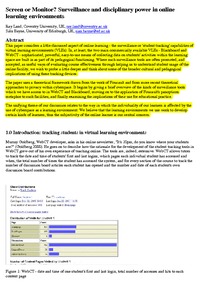Screen or Monitor?Surveillance and disciplinary power in online learning environments
Ray Land, Siân Bayne
Publikationsdatum:
Zu finden in: Education in Cyberspace, 2004
 |
 |
 Diese Seite wurde seit 2 Jahren inhaltlich nicht mehr aktualisiert.
Unter Umständen ist sie nicht mehr aktuell.
Diese Seite wurde seit 2 Jahren inhaltlich nicht mehr aktualisiert.
Unter Umständen ist sie nicht mehr aktuell.
 Zusammenfassungen
Zusammenfassungen
 Dieses Paper weist auf die Überwachungsmöglichkeiten aktueller Learning Management Systeme (LMS) hin und vergleicht diese mit der Panopticums-Metapher von Foucault. Damit prägen Learning Management Systeme auch die Lernenden, welche die potenzielle Überwachung verinnerlichen.
Dieses Paper weist auf die Überwachungsmöglichkeiten aktueller Learning Management Systeme (LMS) hin und vergleicht diese mit der Panopticums-Metapher von Foucault. Damit prägen Learning Management Systeme auch die Lernenden, welche die potenzielle Überwachung verinnerlichen.This paper considers a little-discussed aspect of online learning - the surveillance or 'student tracking' capabilities of virtual learning environments (VLEs). In, at least, the two main commercially available VLEs - Blackboard and WebCT - sophisticated, powerful, easy-to-use means of collecting data on students' activities within the learning space are built in as part of its pedagogical functioning. Where such surveillance tools are often promoted, and accepted, as useful ways of evaluating course effectiveness through helping us to understand student usage of the online facility, we wish to probe a little deeper and think about some of the broader cultural and pedagogical implications of using these tracking devices.
The paper uses a theoretical framework drawn from the work of Foucault and from more recent theoretical approaches to privacy within cyberspace. It begins by giving a brief overview of the kinds of surveillance tools which we have access to in WebCT and Blackboard, moving on to the application of Foucault's panopticon metaphor to such facilities, and finally examining the implications of their use for educational practice.
The unifying theme of our discussion relates to the way in which the individuality of our learners is affected by the use of cyberspace as a learning environment. We believe that the learning environments we use work to develop certain kinds of learners, thus the subjectivity of the online learner is our central concern.
Von Ray Land, Siân Bayne im Text Screen or Monitor? (2002) The paper uses a theoretical framework drawn from the work of Foucault and from more recent theoretical approaches to privacy within cyberspace. It begins by giving a brief overview of the kinds of surveillance tools which we have access to in WebCT and Blackboard, moving on to the application of Foucault's panopticon metaphor to such facilities, and finally examining the implications of their use for educational practice.
The unifying theme of our discussion relates to the way in which the individuality of our learners is affected by the use of cyberspace as a learning environment. We believe that the learning environments we use work to develop certain kinds of learners, thus the subjectivity of the online learner is our central concern.
 Dieser Text erwähnt ...
Dieser Text erwähnt ...
 Dieser Text erwähnt vermutlich nicht ...
Dieser Text erwähnt vermutlich nicht ... 
 Nicht erwähnte Begriffe | Ilias, Moodle, Schule, Unterricht |
 Tagcloud
Tagcloud
 Zitationsgraph
Zitationsgraph
 Zitationsgraph (Beta-Test mit vis.js)
Zitationsgraph (Beta-Test mit vis.js)
 Zeitleiste
Zeitleiste
 3 Erwähnungen
3 Erwähnungen 
- Micromedia and Corporate Learning - Proceedings of the 3rd International Microlearning 2007 Conference (Martin Lindner, Peter A. Bruck) (2007)


- The Microlearning Agenda in the Age of Educational Media (Norm Friesen)

- The Microlearning Agenda in the Age of Educational Media (Norm Friesen)
- Schule verändern - Offenheit als Herausforderung in der Governance von Bildungsinnovationen (Marianne Ullmann) (2012)

- 25 Years of Ed Tech (Martin Weller) (2020)

 Volltext dieses Dokuments
Volltext dieses Dokuments
 |  Screen or Monitor?: Artikel als Volltext ( Screen or Monitor?: Artikel als Volltext ( : :  , 141 kByte; , 141 kByte;  : :  Link unterbrochen? Letzte Überprüfung: 2021-03-21 Letzte erfolgreiche Überprüfung: 2013-05-28) Link unterbrochen? Letzte Überprüfung: 2021-03-21 Letzte erfolgreiche Überprüfung: 2013-05-28) |
 Anderswo suchen
Anderswo suchen 
 Beat und dieser Text
Beat und dieser Text
Beat hat Dieser Text während seiner Zeit am Institut für Medien und Schule (IMS) ins Biblionetz aufgenommen. Beat besitzt kein physisches, aber ein digitales Exemplar. Eine digitale Version ist auf dem Internet verfügbar (s.o.). Es gibt bisher nur wenige Objekte im Biblionetz, die dieses Werk zitieren.









 Learning Management System (LMS) / Lernplattform
Learning Management System (LMS) / Lernplattform LehrerIn
LehrerIn Macht
Macht Privatsphäre
Privatsphäre Überwachung
Überwachung





 Biblionetz-History
Biblionetz-History